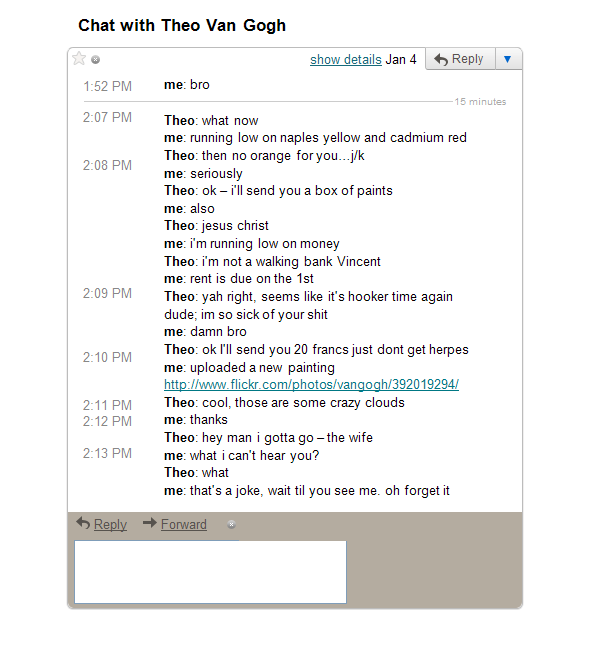“Why would people sell themselves short and not just live the life of pure creative glamour.”
httpv://www.youtube.com/watch?v=lQ3SVpE9LTQ
On Friday night I read Dan Hoy’s post over at Montevidayo entitled THE PIN-UP STAKES: Poetry & The Marketing of Poetry. Approximately 2 hours later I was wasted in a bar across the street from my apartment, yelling at my roommate (who doesn’t really read poetry) that it was the best thing ever, insisting that she read it on her smart phone. About two hours after that I tweeted the phrase “If you take the lyrics to pop musick seriously they become the map of utopian society” (the “k” at the end of “musick” is my own superfluous nomenclature that surfaces mostly while “under the influence,” tying music to “magick” of course).
What was in my head, still, other than Hoy’s essay itself, was the video above, and more particularly, the song within the video.
httpv://www.youtube.com/watch?v=bw2o_Go4QWI
No, Fuck You
Ah, the confrontational interview. I had this idea it did exist. Then where has it gone? The jostle, cough, the lip-curl. And without it, haven’t we lost something? To discuss, to pry and fling, not what we’re instructed or allowed (a la Tom Cruise [and many others] who actually inculcate the interviewer in advance—you will only ask these very questions). And so then we have nothing more than a softball game played with bats made of limp, leaking sausages. Toy dogs smelling each other’s asses. A farce.
Because we lose surprise, abrupt honesty, what ego and anger can do: make us blurt out something we might regret, or possess, or shock or please our own self with, something true. But some of this comes down to the medium. Over email, my gods, we can all blurb profound. We cheat, and suddenly I am quoting Beckett and know something about mortgage-backed securities, MFA statistics, and the best clothing option for a casual late fall round of bocce ball (Cabela’s MicroDown soft shell, in hue woodland). An interview over the phone, you might have notes or might be naked (a clear advantage for flow of thought). You don’t see the interviewer at all, the nonverbals, the power of space, but at least it is real time and has potential for nasty, like when Terry Gross asks Gene Simmons about wearing a studded codpiece:
Gene Simmons: No, it holds in my manhood.
Terry Gross: [laughs] That’s right.
Gene Simmons: Otherwise it would be too much for you to take. You’d have to put the book down and confront life. The notion is that if you want to welcome me with open arms, I’m afraid you’re also going to have to welcome me with open legs.
Terry Gross: That’s a really obnoxious thing to say.
Dan Magers’s WHITE-COLLAR WORKER: I AM A DESTINY
 There’s a new chapbook online at H_NGM_N — Dan Magers’s White-Collar Worker: I Am a Destiny. This one is definitely worth a longer look (and at free, it’s way underpriced). Magers is paying attention to life and giving us not the best sentences to describe it, but the one-liners that best highlight everything else (like, “Someone is having a lot of trouble/in the bathroom.” or “I’m bleeding from the nose. It’s not broken.”) Even if you aren’t — as Magers seems to be — paying attention to arty music and its culture (“The amps are the band. The dudes are the roadies.”) and ramming around with collegiate drunkards (“I have no idea what these kids are talking about./Lacan and baby food.”) you’ll see there’s lots to laugh at and more to find marvelous. I read it quickly and found my reading to be informed by Magers’s early reflection:
There’s a new chapbook online at H_NGM_N — Dan Magers’s White-Collar Worker: I Am a Destiny. This one is definitely worth a longer look (and at free, it’s way underpriced). Magers is paying attention to life and giving us not the best sentences to describe it, but the one-liners that best highlight everything else (like, “Someone is having a lot of trouble/in the bathroom.” or “I’m bleeding from the nose. It’s not broken.”) Even if you aren’t — as Magers seems to be — paying attention to arty music and its culture (“The amps are the band. The dudes are the roadies.”) and ramming around with collegiate drunkards (“I have no idea what these kids are talking about./Lacan and baby food.”) you’ll see there’s lots to laugh at and more to find marvelous. I read it quickly and found my reading to be informed by Magers’s early reflection:
Meaning contains a glancing similarity
to what is happening to me.
January 19th, 2011 / 1:18 pm
I Can’t Really Help It: A Conversation with Ben Marcus

The following conversation between Colin Winnette (colinwinnette.com) and Ben Marcus (benmarcus.com) took place during the brutally mediocre winter of 2011. Both men carved a desk along with extra elbowroom into the walls of their unnecessary ice huts and began a steady email exchange. This was a final attempt to stay warmish. Listed below are the contents of that attempt. Special Thanks to Cassandra Troyan -The Eds.
Ben Marcus is the author of three books of fiction: Notable American Women, The Father Costume, and The Age of Wire and String. His new novel, The Flame Alphabet, will be published by Knopf in January of 2012. His stories, essays, and reviews have appeared in Harper’s, The Paris Review, The Believer, The New York Times, Salon, McSweeney’s, Time, Conjunctions, Nerve, Black Clock, Grand Street, Cabinet, Parkett, The Village Voice, Poetry, and BOMB. He is the editor of The Anchor Book of New American Short Stories, and for several years he was the fiction editor of Fence. He has recently served as the guest fiction editor for Guernica Magazine. He is a 2009 recipient of a grant for Innovative Literature from the Creative Capital Foundation. In 2008 he received the Morton Dauwen Zabel Award from the American Academy of Arts and Letters, and he has also received a Whiting Writers Award, a National Endowment for the Arts Fellowship in fiction, three Pushcart Prizes, and a fiction fellowship from the Howard Foundation of Brown University, where he taught for several years before joining the faculty at Columbia University’s School of the Arts.
*Portions of this interview first appeared in the Winter 2011 issue of the Tex Gallery Review
CW:Could you talk a little about your upcoming book, The Flame Alphabet? Its genesis and where things went from there?
BM: I’d been thinking for years about language as a toxic substance. Language itself making people sick. Speech and text, all of it poisonous. If you read a road sign you get nauseous. That was the original idea, but after Notable American Women I really didn’t want to write another heavily-conceptual, modular book. With that book, every new chapter felt like I was starting over. I wanted to write something continuous, a straight shot powered by one voice. I tried a lot of voices, forms, and approaches, and threw all of it away. But then I was doing some reading on underground Jewish cults and I found a pretty natural way to connect a language toxicity to a really personal narrative, even if that meant liberal falsifications and misreadings, and a story sort of bloomed fast out of that: a husband and wife who are sickened by the speech of their daughter. Literally. So sickened that they have to leave her. A situation so bad you’d have to abandon your child. This really frightened me, and I couldn’t even imagine it, which meant I had to chase it down. That was the opening premise, and once I had that I wrote the book in just over a year.
January 19th, 2011 / 1:06 pm
“The most important and enjoyable thing in life is doing something that’s a complicated, tricky problem for you that you don’t know how to solve.” -William Vollmann
The expurgation of the clitoris in the diary of Anne Frank
While we’re on the topic of the modification of Huck Finn, here’s something interesting posted on the Give a Fig (Les Figues Press) blog:
The effacement of the clitoris extends even to Anne Frank’s Diary of a Young Girl. When the unabridged edition of the diaries were released in 1995, the 50th anniversary of her death, they included the previously deleted passages that contained some of Anne’s negative remarks about her housemates and parents as well as a lengthy entry from March 24, 1944 in which she describes her vulva, clitoris, and vagina from the perspective of her own fifteen year old gaze:
“…Until I was eleven or twelve, I didn’t realize there was a second set of labia on the inside, since you couldn’t see them. What’s even funnier is that I thought urine came out of the clitoris…When you’re standing up, all you see from the front is hair. Between your legs there are two soft, cushiony things, also covered with hair, which press together when you’re standing, so you can’t see what’s inside. They separate when you sit down and they’re very red and quite fleshy on the inside. In the upper part, between the outer labia, there’s a fold of skin that, on second thought, looks like a kind of blister. That’s the clitoris…”
Bellow on Auden, Austrians, Bernhard, Cons, and Cold-Owl Trips
 Saul Bellow was an old-fashioned man of letters. Part of what that means is that he traded a lot of letters with other people and seemed to have literary aspirations for his letters. I read a review of his newly collected letters which said that since people don’t write letters anymore, this was probably the last rich collection of letters we’d be seeing from a literary man. I doubt this is true, considering the generation after him figures prominently in his letters. I doubt Philip Roth will allow the posthumous publication of his letters, but I bet his letters will rival Bellow’s letters, some of which are to Roth. I also know that writers even from my own generation are still trading letters with the likes of, say, Don DeLillo. And I’ve seen the treasure trove of Raymond Carver’s correspondence in the Charvat collection at the Ohio State University, where I had to sign a form saying I wouldn’t tell you what was in them, but, listen hot-shit literary biographers interested in Carver’s era: There is stuff in there that will make your hair stand on end. There was a fair bit of nastiness flying about our nation’s postal thoroughfares in Carver days.
Saul Bellow was an old-fashioned man of letters. Part of what that means is that he traded a lot of letters with other people and seemed to have literary aspirations for his letters. I read a review of his newly collected letters which said that since people don’t write letters anymore, this was probably the last rich collection of letters we’d be seeing from a literary man. I doubt this is true, considering the generation after him figures prominently in his letters. I doubt Philip Roth will allow the posthumous publication of his letters, but I bet his letters will rival Bellow’s letters, some of which are to Roth. I also know that writers even from my own generation are still trading letters with the likes of, say, Don DeLillo. And I’ve seen the treasure trove of Raymond Carver’s correspondence in the Charvat collection at the Ohio State University, where I had to sign a form saying I wouldn’t tell you what was in them, but, listen hot-shit literary biographers interested in Carver’s era: There is stuff in there that will make your hair stand on end. There was a fair bit of nastiness flying about our nation’s postal thoroughfares in Carver days.
But I digress. Bellow’s letters are worth your time. They’re occasionally cranky. He was a political bird, to be sure, and it served his writing career and the writing career of others he helped. This isn’t the best stuff. The best stuff comes in late-life letters to true pals about matters that aren’t literary. Even in his eighties, the guy had a tremendous psychological acuity, and he always had the knack for special language (he tells a correspondent that he is awaiting a letter “in which you would be a little more recognizable than the Oscar of ‘cons’ and cold-owl trips to see a girl who fucks.”)
We recently Bernhard-obsessed types (surely I’m not the only one) will be interested in this:
As for Thomas Bernhard, he is a very strange bird indeed. I read him with respect and even admiration but he doesn’t reach my warmer feelings. What he does reach is my own bottomless hatred of the Nazis, especially the Austrian ones. He would have you think that virtually all Austrians were and remain Nazis. I see no reason to disagree. When I read Karl’s lovely poem about Auden’s grave I wondered why Auden should have wished to pass his last years [at Kirchstetten] in the society of such creeps. I seem to recall that he even addressed affectionate lines to some of them.
Yuknavitch, Lidia. The Chronology of Water (Hawthorne, 2011)

“I’ve read Ms. Yuknavitch’s book The Chronology of Water, cover to cover, a dozen times. I am still reading it. And I will, most likely, return to it for inspiration and ideas, and out of sheer admiration, for the rest of my life. The book is extraordinary..”
–CHUCK PALAHNIUK, author of Fight Club and Pygmy“The Chronology of Water’s central metaphor works beautifully: we all keep our heads above water, look around, and enjoy our corporeal life despite all the reasons not to; beyond that, the book is immensely impressive to me on a human level: the narrator/speaker/protagonist/author emerges from a seriously hellish childhood and spooky adolescence into a middle age not of bliss, certainly, but of convincing engagement and satisfaction.”
–DAVID SHIELDS, author of Reality Hunger: A ManifestoMore praise here
Watch the book trailer here
Available for preorder now until April 1 from Powells or Amazon
I Know Not of War: The Responsibility of the Writer

Over at the Hayden’s Ferry Review blog, Alan Stewart Carl wrote a really interesting essay in response to my posts about race, class, Best American Short Stories, and publishing at large. In his essay, he grapples with his responsibility as a writer who self-identifies as a white, middle class man.
He writes:
Yes, there is plenty all writers can do to change things on the editorial front and on the promotional front and on the educational and societal front, too. But what about the writing itself? Should white, middle-class male writers feel any pressure to write about people and experiences outside of those they intimately know? Would doing so even help matters?
Ultimately, he concludes that as a writer he has a responsibility not only to himself and the stories he wants to tell but also to the outside world because, “writing towards the outside world seems like a good way to proceed forward.”



